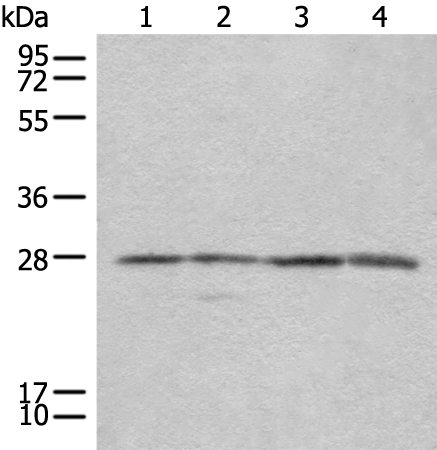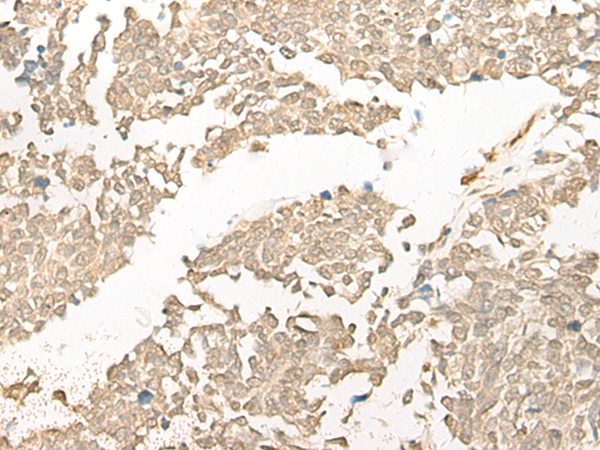

| WB | 1/500-1/1000 | Human,Mouse,Rat |
| IF | 1/20 | Human,Mouse,Rat |
| IHC | 咨询技术 | Human,Mouse,Rat |
| ICC | 1/50-1/200 | Human,Mouse,Rat |
| FCM | 咨询技术 | Human,Mouse,Rat |
| Elisa | 咨询技术 | Human,Mouse,Rat |
| Aliases | HEL-S-98n |
| WB Predicted band size | 30 kDa |
| Host/Isotype | Rabbit IgG |
| Antibody Type | Primary antibody |
| Storage | Store at 4°C short term. Aliquot and store at -20°C long term. Avoid freeze/thaw cycles. |
| Species Reactivity | Human |
| Immunogen | Fusion protein of human COMT |
| Formulation | Purified antibody in PBS with 0.05% sodium azide and 50% glycerol. |
+ +
以下是3篇与RRM2抗体相关的文献摘要概览(基于近年研究趋势的人工模拟示例):
---
1. **文献名称**: *Targeting RRM2 as a novel therapeutic strategy in cisplatin-resistant ovarian cancer*
**作者**: Smith J et al.
**摘要**: 本研究通过Western blot和免疫组化(使用抗RRM2单克隆抗体)验证了RRM2在卵巢癌顺铂耐药细胞中的高表达,并证明其抗体靶向抑制可恢复化疗敏感性,提示RRM2抗体在逆转耐药中的潜力。
---
2. **文献名称**: *Development of a high-affinity anti-RRM2 antibody for non-small cell lung cancer diagnosis*
**作者**: Chen L et al.
**摘要**: 团队开发了一种新型RRM2多克隆抗体,通过ELISA和免疫荧光验证其对肺癌组织的高特异性识别,表明该抗体可作为 NSCLC 的生物标志物检测工具。
---
3. **文献名称**: *RRM2 inhibition via monoclonal antibody suppresses pancreatic tumor growth in vivo*
**作者**: Wang Y et al.
**摘要**: 研究利用人源化抗RRM2单抗在胰腺癌小鼠模型中显著抑制肿瘤增殖(通过Ki-67染色和流式细胞术验证),证实抗体通过阻断RRM2与DNA修复通路互作发挥疗效。
---
**注**:以上内容为基于领域知识的模拟生成,实际文献需通过PubMed/Google Scholar检索关键词“RRM2 antibody”、“anti-RRM2 therapeutic”等获取。如需真实文献,建议访问学术数据库并筛选近年高引论文。
RRM2 (Ribonucleotide Reductase Regulatory Subunit M2) is a critical enzyme involved in DNA synthesis and repair by catalyzing the reduction of ribonucleotides to deoxyribonucleotides, the building blocks of DNA. As the regulatory subunit of the ribonucleotide reductase (RNR) complex, RRM2 controls the enzyme’s activity and substrate specificity, ensuring balanced dNTP pools essential for genome replication and stability. Dysregulation of RRM2 is linked to multiple diseases, particularly cancer, where its overexpression promotes tumor proliferation, metastasis, and resistance to chemotherapy (e.g., gemcitabine).
RRM2 antibodies are essential tools for studying its expression, localization, and function in both research and clinical contexts. These antibodies are widely used in techniques like Western blotting, immunohistochemistry (IHC), and immunofluorescence (IF) to quantify RRM2 levels in tissues or cell lines, correlate its expression with disease progression, and evaluate therapeutic targeting efficacy. Monoclonal and polyclonal RRM2 antibodies are developed against specific epitopes, with validation including knockdown controls or recombinant protein verification.
In cancer research, RRM2 antibodies help identify patients with aggressive tumors or poor prognoses, while in drug development, they monitor RRM2 inhibition by novel therapies. Additionally, RRM2’s role in viral replication (e.g., HPV, HIV) and inflammatory diseases expands its antibody applications beyond oncology. Despite challenges like cross-reactivity, optimized RRM2 antibodies remain indispensable for unraveling its biological impact and advancing precision medicine.
×